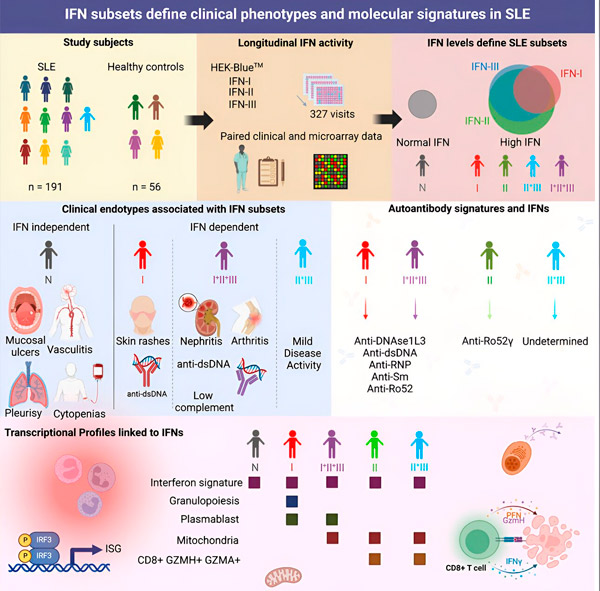New publications
New study shows that certain combinations of antiviral proteins are responsible for lupus symptoms
Last reviewed: 02.07.2025

All iLive content is medically reviewed or fact checked to ensure as much factual accuracy as possible.
We have strict sourcing guidelines and only link to reputable media sites, academic research institutions and, whenever possible, medically peer reviewed studies. Note that the numbers in parentheses ([1], [2], etc.) are clickable links to these studies.
If you feel that any of our content is inaccurate, out-of-date, or otherwise questionable, please select it and press Ctrl + Enter.

In a new study, researchers at Johns Hopkins Medicine say they have figured out why lupus symptoms and severity vary among people with the autoimmune disease, which affects up to 1.5 million Americans. The team says it is an important step forward in understanding the biology of lupus and could lead to changes in how doctors treat patients with the disease.
The full report, published in the journal Cell Reports Medicine, concludes that specific combinations and elevated levels of immune system proteins known as interferons are associated with certain lupus symptoms, such as skin rashes, kidney inflammation and joint pain.
Interferons usually help fight infection or disease, but in lupus they are overactive, causing widespread inflammation and damage. The study also shows that other common lupus symptoms cannot be explained by elevated interferon levels.
"We've been learning for years that interferons play a role in lupus," says lead study author and rheumatologist Dr. Felipe Andrade, an assistant professor of medicine at Johns Hopkins Medicine. He explains that the study began with questions about why some lupus treatments weren't working for some patients.
"We saw cases where the patient's condition surprisingly did not improve - we wondered whether certain groups of interferons were involved."
Some lupus treatments target a specific group of interferons known as interferon I. During clinical trials of these treatments, the team observed that some patients did not improve despite genetic tests showing high levels of interferon I before treatment, or what experts call a high interferon signature. The team hypothesized that two other groups of interferons, interferon II and interferon III, might be responsible for these poor treatment responses.
To find out, the team looked at how different combinations of interferons I, II, or III and their overactivity might manifest in people with lupus. The researchers took 341 samples from 191 participants to determine the activity of the three groups of interferons, and used human cell lines specifically engineered to respond to the presence of each specific group of interferons to analyze the samples.
Through this process, the researchers determined that most participants fell into four categories: those who had only elevated interferon I; those who had a combination of elevated interferons I, II, and III; those who had a combination of elevated interferons II and III; or those who had normal interferon levels.

Source: Cell Reports Medicine (2024). DOI: 10.1016/j.xcrm.2024.101569
The researchers were able to use this data to also establish several links between these interferon combinations and lupus symptoms. In those with elevated interferon I, lupus was primarily associated with symptoms affecting the skin, such as rashes or ulcers. Participants with elevated levels of interferons I, II, and III had the most severe lupus manifestations, often with significant damage to organs such as the kidneys.
However, not every lupus symptom was associated with elevated interferons. Blood clots and low platelet counts, which also affect clotting, were not associated with elevated levels of interferons I, II, or III.
The researchers believe this indicates that both interferon-dependent and other biological mechanisms are involved in this complex disease. The study also found that genetic testing of genes associated with these groups of interferons, or interferon signatures, does not always indicate elevated interferon levels. They plan to investigate this in future studies.
"Our study showed that these groups of interferons are not isolated; they work as a team in lupus and can give patients different manifestations of the disease," says rheumatologist Dr. Eduardo Gomez-Bañuelos, an assistant professor of medicine at Johns Hopkins Medicine and the study's first author. Assessing a patient's elevated interferon combinations provides a better understanding of how they might respond to treatment and allows doctors to group them into clinical subtypes of lupus, Gomez-Bañuelos explains.
